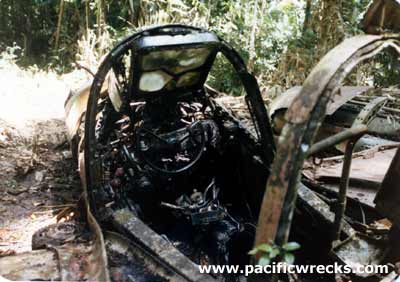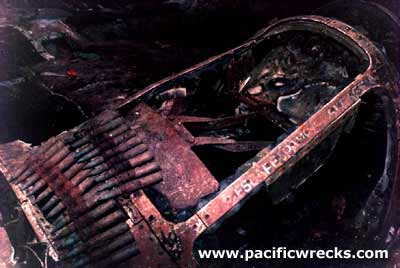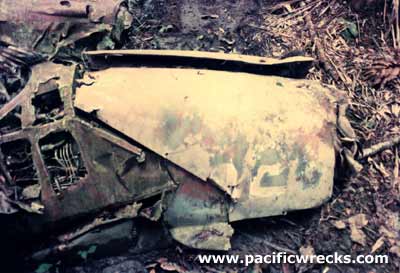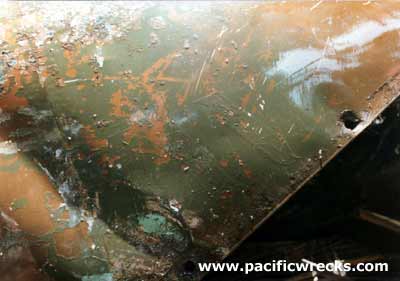I went to Popondetta in 1985 to buy coffee.
In my first two years there I visited about 24 different air wrecks
many of them B-25s. I did not keep a diary but I did keep a map
of where everything was that I came across. The natives became accustomed
to my weekend wanderings around the old airfields and the battlefields
of Kokoda, Buna, Gona and Sanananda. This was rich country for someone
like me. In the course of my travels I became befriended by a local
man named Frank Egiembari who lived just near the Girua airport. Frank and I became good friends.
(Initially I think Frank saw me as a potential son-in-law but we
got past that) It was he who, in about 1987/88,
told me that a relative of his had the wreck of an aircraft on his
land. So we investigated.
The wreck was in wooded country not far off the
Popondetta to Oro Bay road but what really took my fancy was that
it was a P-38 and in very good condition. I had always wanted to
find a P-38 but there are not many of them around. We set to and
cleaned up around the wreck site and then gathered the broken booms
and tail of the aircraft and laid them out to make the aircraft
look as complete as possible. There were no guns in the aircraft.
These had most probably been salvaged at the time of it's crash
back in the 1940’s. My first thoughts went to my friend Richard
Leahy who loves to photograph everything.
The following weekend Richard flew down to Popondetta
and together we visited the crash site. As Richard was taking photographs
I set about making the wreckage just a little more photogenic. On
the port side of the cockpit a piece of metal had been cut away
and folded down and this I folded back up into it’s original
position. Richard saw what I was doing and suggested to me that
I get something and wipe away the forty odd years of mud that had
built up on that part of the cockpit as pilots were known to write
their names in that area. With the remains of an old bag I began
wiping away and behold, not only did we have a pilots name: Capt
R. E. Smith, but we also had 7 kill flags. An air ace. Things moved
quickly after that.
Bruce Hoy, the then PNG Museum modern history curator, has the most detailed knowledge of all things
‘Air Force’ in WW2 PNG. Through him Richard was able
to acquire an address for Gene Smith. I then wrote a letter to Gene
sent the letter to Richard who enclosed photo’s that he had
taken. Richard then sealed the letter and sent it off to Florida
in the USA. In the meantime, unbeknown to any of us, Mr and Mrs
Richard Eugene Smith of Florida were making final preparations for
a trip down-under to visit all the places where Gene had served
during WW2. With the most exquisite timing our letter arrived just
prior to their departure and so they altered their itinerary to
include a trip to Popondetta.
Richard E. Smith visits his former
aircraft
They duly arrived at Popondetta on the
wettest day of the year. Then to complicate matters some village
elders decided to make Genes visit a reason to claim for war damage
compensation and so deny him access to the wreck site. This situation
overcome we went to the wreck site in the midst of a tropical down
pour. Poor Mrs Smith, she looked a wreck but she was determined
to make it, and she did. Fortunately the walk to the wreck was only
short and over flat ground. The encounter between Gene and The Japanese
Sandman was one of the most emotional scenes I have ever witnessed.
According to Gene he was the only person who ever piloted this P-38
and that it was one hot aircraft to fly. It also must be understood
that Gene did not crash it. That event occurred after he had rotated
back State side. He began half talking to himself, half talking
to his wife. “This is ma baby honey, this is ma baby. You
see honey she wouldn’t fly for no one else, she’d only
fly for me honey.” These words were spoken softly and with
deep emotion. How many other aces are there who can be matched with
their original ace aircraft? I suggest that there are probably none,
which makes this encounter all the more unique and I feel privileged
to have played a part and been a witness. The Smiths stayed in Popondetta
that night and flew out the following day. A lovely couple. Gene
Smith, like so many of his generation who looked down the barrel
of a gun, and survived, was soft spoken, modest and a gentleman.
I really wanted Gene to have a
souvenir from his aircraft. I had no qualms about this, and who
deserves it more. At this
vital moment my friend Frank found himself owing me a very big
favor
– I knew just how it could be repaid. I told him what I wanted
and then departed for a short trip to Australia. Shortly after
my
return to Popondetta Frank appeared at my doorstep with a large
sack. Inside, just as I had requested, were the instrument panel
and the control wheel from out of the Sandmans cockpit. The instrument
panel is most significant because it has riveted to it the aircraft’s
Radio Call sign which is made up from the aircraft’s serial
number. This makes the instrument panel unique to one aircraft.
These two items I dispatched to the USA where they were duly received.
All in all this was a most enjoyable and rewarding experience.
Return to David Pennefather Main Page |






